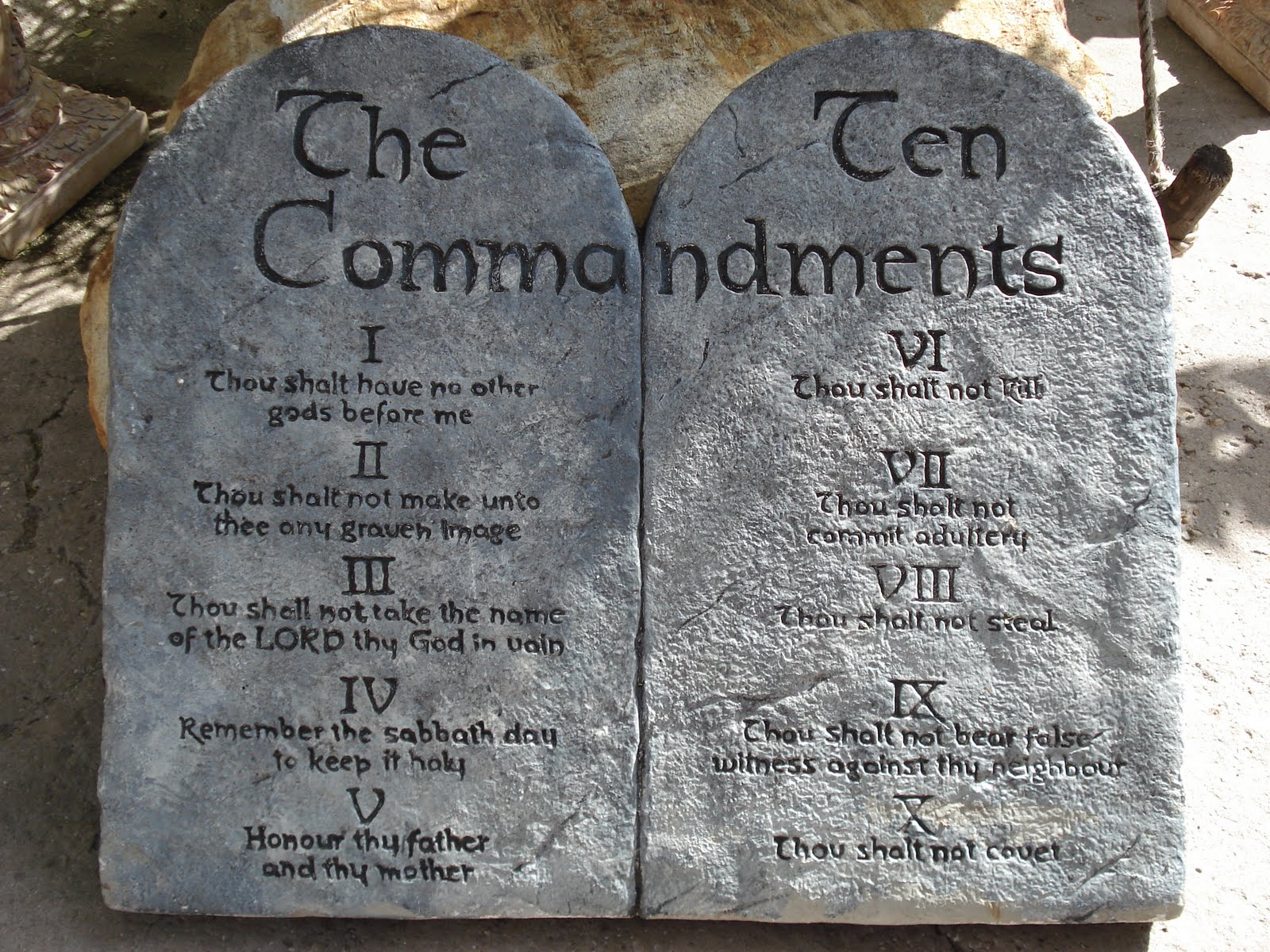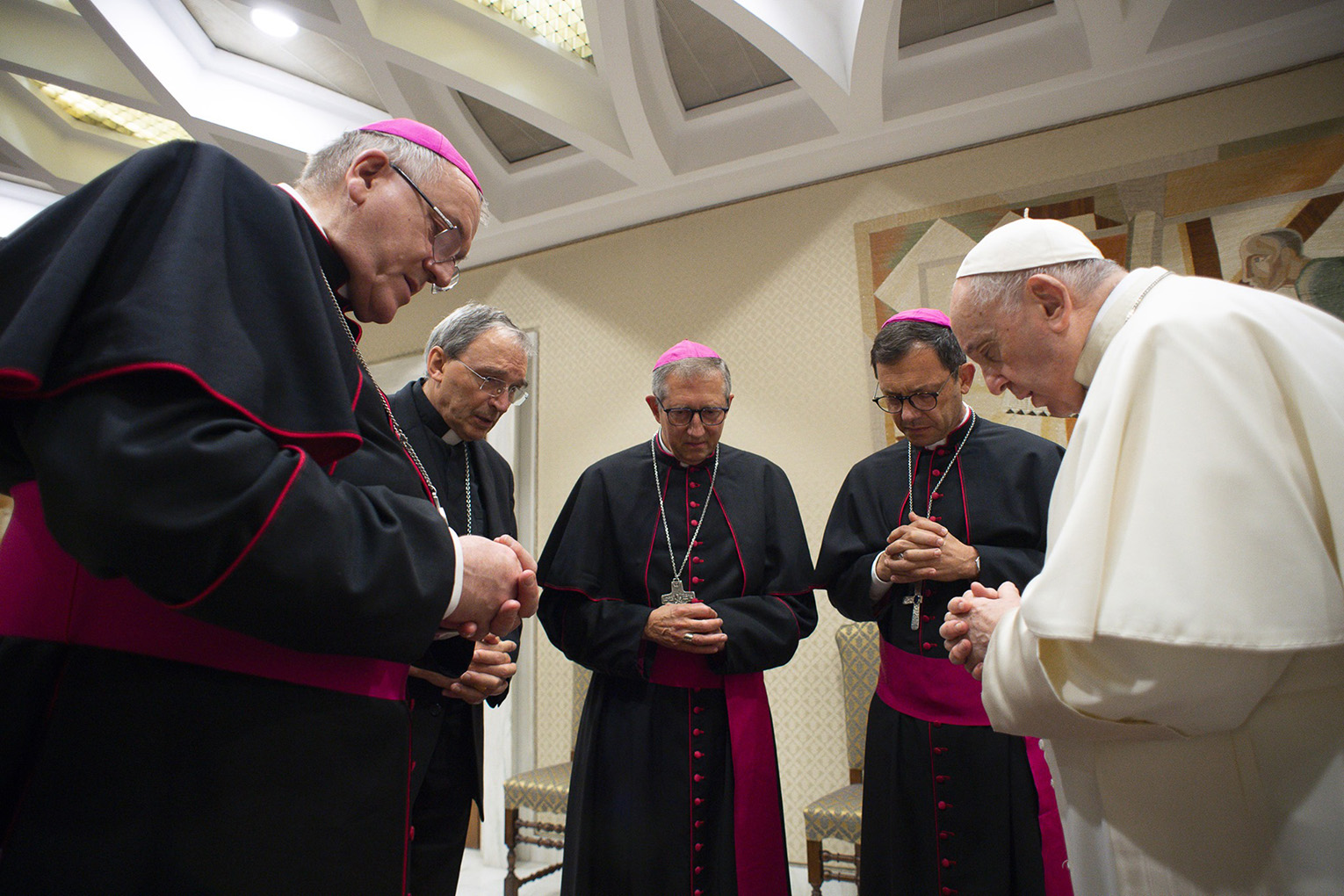
Not All of Them Are There
Sometimes, the Protestants accuse the Catholic Church of having changed the Ten Commandments. They affirm that in the Bible (Ex 20: 2-17), the 2nd commandment says “you shall not make for yourself an idol, whether in the form of anything that is in heaven above, or that is on the earth beneath, or that is in the water under the earth” (v. 4), and the Catholics have abolished it.
This in part is true. But then, do they have the authority to do this? If we want to clarify this question, there is a need to study the history of the commandments.
The book of Exodus tells that, upon being free from slavery in Egypt, the people of Israel walked for three months through the desert until they arrived at the foot of Mount Sinai. Moses climbed to the top where Yahweh appeared to him, and amidst thunder, earthquake, fire and the sound of trumpets, gave to him the commandments.
The Twelve Commandments
The Bible teaches clearly that the commandments are ten (Dt 4:13; 10:4). But here is the first difficulty: they are not enumerated. And when we count them, they do not appear to be ten, but twelve commandments. These are:
You shall not have other gods aside from me (Ex 20:3).
You shall not have any statue or image (v. 4).
You shall not prostrate before it or give it homage (v. 5).
You shall not take the name of Yahweh your God in vain (v. 7).
Remember the day of Sabbath (v. 8).
Honor your father and your mother (v. 12).
You shall not kill (v. 13).
You shall not commit adultery (v. 14).
You shall not steal (v. 15).
You shall not give false testimonies against your neighbors (v. 16).
You shall not desire the house of your neighbor (v. 17a).
You shall not desire the wife of your neighbor (v. 17b).
In Search of the Ten
If the Bible indicates that the commandments are ten, how are we going to count them so that they come up to this number? The Jews and the Christians debated this from antiquity, and they proposed diverse modes of enumerating them.
The first clarifications were from the Jew, Philon of Alexandria and the historian, Josephus Flavius, both from the 1st century. According to them, the 1st commandment demands only one God (v. 3). The 2nd prohibits the making of images and prostrating before them (v. 4-5). The 3rd orders not to take the name of God in vain (v. 7). The 4th prescribes that they make holy the day of the Lord (v. 8). From the 5th to the 9th, they are enumerated as they are (v. 12-16). And the 10th would be v. 17, an admonition not to desire the wife of the neighbor or to covet someone else’s goods.
This classification distinguished four commandments for God and six for the neighbor, and was accepted by the various old Christian writers, like Origen, Tertullian and St. Gregory Nazianzene. It is also accepted by the Lutheran, Calvinist and Anglican protestants.
The Judean Proposal
But, official Judaism did not accept it. When the rabbis wrote the Talmud, their sacred book, they proposed another manner of counting them. They considered v. 2, not as a commandment but the prologue or presentation of the Decalogue. They considered “I, Yahweh, am your God, who have brought you out from the land of Egypt, from the house of slavery” as the 1st commandment. In order to form the 2nd commandment, they combined the following three: the prohibition to have other gods, the fabrication of images, and prostrating before them (v. 3-5). The 3rd commanded not to take the name of God in vain, and the 10th combined the desire for the neighbor’s wife and someone else’s goods as one precept.
All of the Jews adopted this second division, also of four commandments concerning God and six concerning humans.
The Christian Proposals
In the 5th century St. Augustine, one of the major doctors of the Church, proposed a third division of the commandments. Similarly with the rabbis of the Talmud, he affirmed that the precepts of not having other gods, not fabricating images, and not prostrating before them, were in reality one commandment told in diverse manners. They referred to one and the same thing: shunning idolatry or the worship of false gods. For this he understood that the three had to be joined together (v. 2-6) into one commandment. But this was not to be the 2nd, as the rabbis had it, but the 1st commandment.
Augustine considered not taking the name of God in vain as the 2nd commandment, and sanctification of feasts as the 3rd. But by joining the first commandments, the list lacked one in order to complete the ten. So he split the 9th commandment in v. 17 into two distinct precepts: the 9th commandment that prohibited the desire of the wife and of the neighbor, and the 10th about the goods of the neighbor. He was the first to propose two distinct commandments in this verse.
The new classification of Augustine recognized only three commandments focusing on God and seven on neighbor. According to him, the reason was purposeful. The three precepts referring to God served better to emphasize the Holy Trinity.
This third manner of dividing the commandments was followed by almost all Christian theologians and medieval scholars, and was later decided as the official list by the Catholic Church.
To Teach Catechism
In the middle of the 16th century, when popular teaching of catechism started, it was a necessity for people to memorize the Ten Commandments as their examination of conscience for confession and as an aid to spiritual life. But the translation did not lend itself to this. The Ten Commandments belonged to an epoch when the Israelites had a primitive moral standard. They did not include the progress flowing from revelation in the life and teachings of Jesus. For example, the Decalogue mentioned “other gods” because the Israelites believed that other divinities really existed for other nations; but today we know that only one God exists for all religions. The Decalogue prohibited having images but in the New Testament, Christ was described as the image of the invisible God (Col 1:15). Therefore, it is lawful for Christians to express their faith with images. It also mandated to sanctify Saturday, while Christians commemorate Sunday as the day of salvation, when Christ came back from the dead.
The Church, therefore, resolved to elaborate a new Decalogue for the catechism. Our guide was improved with Christ who surpassed the Old Testament. It is in the same manner that Christian life has gone beyond the sacrifice of animals in the Old Testament: the beheading of sheep, the burning of heifers and the bloody killing of lambs in the Temple.
Commandments for Christians
In the new list, the 1st commandment suppressed the other gods and was formulated in a positive and more perfect manner: “To love God above all things.”
In the 2nd, the images were eliminated because its meaning was the same as the previous one: not to fall in the cult of things that would replace God. Its place was supplanted by the following commandment not to take the name of God in vain.
In the 3rd, to sanctify a day of the week in memory of the Lord was modified. Instead of Saturday, Sunday was chosen to commemorate the day of Christ’s resurrection.
The 6th prohibited adultery, that is, to take a married woman. But to be united with a single woman was not prohibited. The Church converted this to a more profound and exigent prohibition: “not to fornicate” which is a prohibition to have relations with any woman outside marriage.
The 7th, “not to rob”, in the Hebrew language referred to the sequestration of a person. It was made more generic, “not to steal” which included any kind of property.
The 8th alluded exclusively to not giving false testimony in trials. To it was added “nor to lie” in order to adapt it to any other circumstance in life.
Finally the 10th that ordered not to desire a woman nor to the other belongings of the neighbor was broken into two: the 9th, primarily and solely referred to a woman, and the 10th to the goods of people.
In this manner the Church re-established the 10 commandments, so that they can stay prominent in the new Christian morality. This is why the list of the commandments from the Bible does not coincide with what were taught to us in the catechism
The Catechism of the Israelites
Can the Church change the Ten Commandments? In order to respond to this question, it is necessary to see how the Ten Commandments appeared among the people of Israel. The Bible says that Moses received them on the mountain of Sinai, and he gave them later to the people in a solemn ceremony. But if we analyze them carefully, they do not seem to correspond to the time of Moses, the time of the pilgrims in the desert and of nomadic life.
What meaning does it have, for example, to prohibit desiring the “house” of the neighbor, when they were nomads? They did not live in houses, but in tents. It was only when they were settled in the Promised Land that they built houses. The commandment not to give false testimony supposes that tribunals, judges and legal processes already existed, which was impossible during the desert period. It was ordained to rest on Saturday: “you shall not work, neither your son, nor your slave.” They did not have slaves and they themselves were no longer slaves in Egypt.
This made the biblical scholars think that the Ten Commandments belong much better to a time after Moses, when the people were already settled in Canaan, organized with morals and juridical norms relative to more modern times.
The abundance of laws and the necessity of having a brief collection that dealt with graver crimes placed the life of the community in danger. They then resolved to reduce the number of laws. They looked into their laws, particularly those that included the pain of death, that is the ones that ended with the formula “by this way, evil will disappear from among you.”
Mortal Sins
If we look at the book of Deuteronomy which contains the old legislation, we can discover among the many laws the hidden Ten Commandments. It was these earlier laws that were the basis of the Ten Commandments.
Deuteronomy 13:2-6: If somebody appears among us saying: “let us serve other gods” distinct from Yahweh, this man should die. This way shall evil disappear among from you (Corresponds to the 1st commandment).
Deuteronomy 17:2-7: If a man or a woman will serve other gods and prostrate themselves before them, or before the sun, the moon or the stars, they will be stoned to death. In this way shall evil disappear from among you (Corresponds to the 2nd commandment).
Deuteronomy 17:8-13: If somebody does not obey what is being mandated in a judgment, compromising the name of Yahweh in vain, this man must die. In this way shall evil disappear from among you (Corresponds to the 3rd commandment).
Deuteronomy 21:18-21: If a man has a rebel son who does not obey his parents, he will be stoned to death. This way shall evil disappear from among you (Corresponds to the 5th commandment).
Deuteronomy 19:11-13: If a man kills another, the murderer must die. In this way shall evil disappear from among you (Corresponds to the 6th commandment).
Deuteronomy 22:13-21: If a young woman marries a man, and she happens not to be a virgin, she will be stoned to death. In this way shall evil disappear from among you (Corresponds to the 7th commandment).
Deuteronomy 24:7: If a man kidnaps another, the thief must die. In this way shall evil disappear from among you (Corresponds to the 8th commandment).
Deuteronomy 19:16-19: If an unjust witness is presented before another and gives a false testimony, he shall die. In this way shall evil disappear from among you (Corresponds to the 9th commandment).
Deuteronomy 22:22: If a man is found to be lying down with a married woman, the two of them will die. In this way shall evil disappear from among you (Corresponds to the 10th commandment, later split into two).
“From” Moses, but not “by” Moses
The Ten Commandments were brief statements to easily recall the graver laws of the community that carried the pain of death for some members of the clan. It was, in a way, a list of “mortal sins.” It was possibly devised at the time of the judges around the year 1100 BCE, a hundred fifty years after the death of Moses.
The 3rd commandment regarding the rest on Saturday did not appear in Deuteronomy. Maybe in antiquity, it was not grave enough to be a “mortal sin,” and it did not fit in this group of laws. Later, during the exile, the observance of Saturday came to be a decisive criterion of fidelity to Yahweh. Then it was added.
In time, this list gained so much importance among the Hebrews that they started to attribute it to Moses. It was partly true that Moses had been the legislator and the organizer of the entire legal life of the people. Therefore, to say that Moses had given the commandments from Mt. Sinai was a way of giving justice to one who had been the great animator of all the legislation of Israel.
In the same way that the people of Israel adopted a list of commandments and attributed them to Moses, also the Church, the new people of Israel, when it is believed, conveniently re-actualized these Ten Commandments for the life of the Catholic Christians. In this it follows the tradition of the Bible.
The Spirit of the Decalogue
This explains the mysterious, abrupt cut in the narration of the Ten Commandments in Exodus. It is stated: “Moses came down from the mountain and said” ( Ex 19:25). After that, instead of Moses talking, it was God who appeared to be pronouncing the Ten Commandments: “God spoke all these words” (20:1). It means that the continuation of the Ten Commandments given by God to Moses did not form the part of the original story. They were added much later.
But one thing is sure: the Ten Commandments found in the Sacred Scripture inspired and preserved all authority of the Word of God be it that they go back to the time of Moses or the ancestral laws in the life of the Hebrew people.
What truly matters is putting into practice what the sacred text teaches: that humans adore only their Creator, not to harm their neighbor, and not to covet their neighbor’s goods.
From Yahweh to Jesus
One time a youth asked Jesus what must he do in order to be saved (Mk 10:17-22). And the Lord drew his attention to the following of the commandments. But only the precepts referring to the neighbor were mentioned (not to kill, not to steal, not to lie). It is interesting and surprising to notice that Jesus did not mention the 1st commandment: to follow only Yahweh, when we know the importance and centrality this had for the Jews.
But the dialogue continues. As the youth said he observed the commandments since infancy, Jesus asked him to leave everything and follow Him. Here the 1st commandment reappears. Jesus applies to himself the same demand of following Yahweh exclusively. This is a new and revolutionary interpretation of the principal commandment which was unheard of. It was possible only with the Son of God. To follow Jesus is therefore the new Decalogue of Christians.











